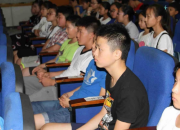四级晨读主题美文
时间:2021-08-31How the Americans View Friendship
Steve and Yaser ‵first met|in their chemistry class|at an American university. Yaser was an ‵international student|from Jordon. He wanted to learn ‵more|about American culture|and hope that he and Steve would become ‵good friends. At first, Steve seemed ‵very friendly. He always greeted Yaser ‵warmly before class. Sometimes he offered to study with Yaser. He ‵even invited Yaser|to eat lunch with him. ‵But after the semester was over, Steve seemed more distant.①The two former classmates|didn’t see each other very much|at school. One day Yaser decided to call Steve. Steve didn’t seem ‵very interested|in talking to him. Yaser was ‵hurt|by Steve’s change of attitude. “Steve said we were friends.” Yaser complained, “and I thought friends were friends|for ever.” Yaser is a little ‵confused. As a foreigner, he doesn’t understand the way|Americans view friendship. Americans use the word “friend”|in a ‵very general way. They may call ‵both casual acquaintances|and close companions “friends”.② These friendships are based on ‵common interests. When the shared activity ‵ends, the friendship may ‵fade. Now as Steve and Yaser|are no longer classmates, their “friendship”|has changed. In some cultures|friendship means a ‵strong life-long bond| between two people. In these cultures|friendships develop ‵slowly, since they are built to last. American society is one of ‵rapid change. Studies show|that one out of five American families ‵moves every year. American friendships develop quickly, and they may change|just as ‵quickly. People from the United States|may at first seem friendly. Americans often chat ‵easily with strangers. But American friendliness|is not always an offer of ‵true friendship. After an experience like Yaser’s|people who’ve been in this country for only a ‵few months|may consider Americans to be fickle. Learning how Americans view friendship|can help non-Americans avoid misunderstandings. It can ‵also make them|make friends the American way. [320 words]
美国人的友谊观
史蒂夫和亚瑟第一次见面是在美国一所大学的化学课上。亚瑟是来自约旦的外国留学生,他想更多地了解美国文化,并希望能和史蒂夫成为好友。起初,史蒂夫显得很友好,上课前他总是热情地与亚瑟打招呼。有时他主动提出与亚瑟一起学习,甚至还邀请亚瑟共进午餐。但学期结束后,史蒂夫显得比较冷淡了。①这两位先前的同班同学在学校不再经常见面。有一天,亚瑟决定给史蒂夫打个电话,可史蒂夫似乎不大愿意与其交谈。史蒂夫态度的改变让亚瑟感到受了伤害。“史蒂夫说过我们是好朋友,”亚瑟抱怨说,“我本来以为是朋友就永远是朋友。”亚瑟有些不解。作为一个外国人,他不理解美国人对友谊的看法。美国人对“朋友”一词的使用非常广泛。他们可能把偶然相识的人和亲密的伙伴都称之为“朋友”。②这些友谊都是基于共同的兴趣。当这些原来共同从事的活动不复存在时,友谊也可能随之淡化。现在亚瑟和史蒂夫不再是同学,所以他们的“友谊”已经发生了变化。在有些文化中,友谊意味着维系两个人之间牢固的持续终生的纽带。在这些文化中,友谊发展得很慢,因为人们是在建立持续终生的感情。而美国社会是个快速变化的社会。有研究显示,每年每五个美国家庭中就有一家迁移。美国人的友谊建立得非常快,其变化也同样快。从美国来的人给人的第一印象是很友好。美国人常随意与陌生人交谈。然而美国人的友好并不总是真正友情的表示。来到美国才几个月的外国人在经历了一次如同亚瑟这样的经历之后,可能会认为美国人易变。了解美国人对友谊的看法,有助于非美国人避免误解,还可以帮助他们学会以美国方式与美国人交朋友。
Competition
It is a plain fact that we are in a world where competition is going on in all areas and at all levels.This is exciting.Yet, on the other hand, competition breeze a pragmatic attitude.People choose to learn things that are useful,and do things that are profitable.Todays' college education is also affected by this general sense of utilitarianism. Many college students choose business nor computing programming as their majors convinced that this professions are where the big money is. It is not unusual to see the college students taking a part time jobs as a warming up for the real battle.I often see my friends taking GRE tests, working on English or computer certificates and taking the driving licence to get a licence. Well, I have nothing against being practical. As the competition in the job market gets more and more intense, students do have reasons to be practical. However, we should never forget that college education is much more than skill training. Just imagine, if your utilitarianism is prevails on campus, living no space for the cultivation of students' minds,or nurturing of their soul. We will see university is training out well trained spiritless working machines.If utilitarianism prevails society, we will see people bond by mind-forged medicals lost in the money-making ventures;we will see humality lossing their grace and dignity, and that would be disastrous.I'd like to think society as a courage and people persumed for profit or fame as a horese that pulls the courage.Yet without the driver picking direction the courage would go straight and may even end out in a precarious situation .A certificate may give you some advantage, but broad horizons, positive attitudes and personal integrities ,these are assets you cannot acquire through any quick fixed way.In today's world, whether highest level of competition is not of skills or expertise , but vision and strategy. Your intellectual quality largely determinds how far you can go in your career.
Chinese Undergraduates in the US
Each year, elite American universities and liberal arts colleges, such as Yale, Harvard, Columbia, Amherst and Wellesley, offer a number of scholarships to Chinese high school graduates to study in their undergraduate programs. Four years ago, I received such a scholarship from Yale.
What are these Chinese undergrads like? Most come from middle-class families in the big urban centers of China. The geographical distribution is highly skewed, with Shanghai and Beijing heavily over-represented. Outside the main pool, a number of Yale students come from Changsha and Ningbo,swhereseach year American Yale graduates are sent to teach English.
The overwhelming majority of Chinese undergraduates in the US major in science, engineering or economics. Many were academic superstars in their high schools - gold medallists in international academic Olympiads or prize winners in national academic contests. Once on US campuses, many of them decide to make research a lifelong commitment.
Life outside the classroom constitutes an important part of college life. At American universities the average student spends less than thirteen hours a week in class. Many Chinese students use their spare time to pick up some extra pocket money. At Yale, one of the most common campus jobs is washing dishes in the dining halls. Virtually all Chinese undergraduates at Yale work part-time in the dining halls at some point in their college years. As they grow in age and sophistication, they upgrade to better-paying and less stressful positions. The more popular and interesting jobs include working as a computer assistant, math homework grader, investment office assistant and lab or research assistant. The latter three often lead to stimulating summer jobs.
Student activities are another prominent feature of American college life. Each week there are countless student-organized events of all sorts - athletic, artistic, cultural, political or social (i.e. just for fun). New student organizations are constantly being created, and Chinese undergrads contribute to this ferment. Sport looms much larger on US campuses than in China. At Yale, intramural sports from soccer to water polo take place all year long; hence athletic talent is a real social asset. One of the Chinese students at Yale several years ago was a versatile sportsman. His athletic talents and enthusiastic participation in sporting events, combined with his other fine qualities, made him a popular figure in his residential college.











